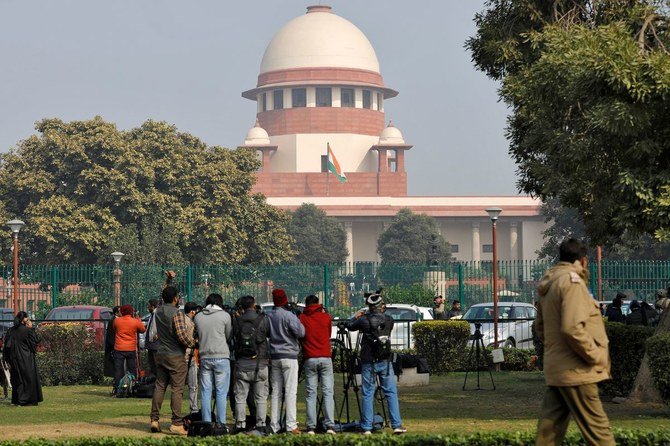NEW DELHI: A day after India’s Supreme Court approved a government plan to pay INR50,000 ($674) for every coronavirus death in the country as compensation to the deceased’s next of kin, experts and victims’ families on Tuesday described the payout as a “joke” and “too little” to ease their suffering.
According to official data, India has registered nearly 447,000 deaths from COVID-19 since the start of the pandemic last year, with the total compensation amounting to more than $300 million based on the $674 payoff.
Experts say the fatality count is at least 10 times higher, with most people losing their lives during the second wave of the outbreak between March and May this year.
Nitish Kumar, 15, from the eastern state of Bihar, lost both of his parents to COVID-19 in May.
He said that while he was “grateful” for the state support, it did not reduce the challenges for him and his two siblings, aged 17 and 13.
“We have no guardian, and I’m the only bread earner left,” he told Arab News. “We need at least INR15,000 to INR20,000 per month to feed ourselves and pay for our education and other expenses. How long will the compensation last against that?”
He worried that the little money they were receiving from the state’s child welfare department and their parents’ meagre savings would soon dry up.
“For us, the major challenge is not only to survive but to establish ourselves and make our future. It seems very difficult now,” said Kumar, who wants to be a doctor.
In its order on Monday, the top court directed the government to disburse the compensatory amount through the state disaster relief fund within 30 days of a family applying.
It also warned authorities not to turn down claims if the death certificates failed to mention COVID-19 as the cause, but specified that “deaths occurring due to poisoning, suicide, homicide” and accidents would not be considered COVID-19 deaths even if it was an accompanying condition.
It said compensation would be provided “over and above the amounts paid by the centre and state under various benevolent schemes.”
Gaurav Kumar Bansal, one of the lawyers who filed a petition seeking payment of INR400,000 each to the families of COVID-19 victims, said the $674 disbursed by the government would not last long.
He suggested instead that the compensation be needs-based.
“The amount would mean a lot for the marginalized section of the society, but it would not be enough for others who are well-to-do,” he told Arab News. “With a family of three, we always need money to survive.”
In his June petition to the court, Bansal said that since the COVID-19 pandemic had been declared a national disaster, the government was legally bound to pay $5,500 to next of kin, as mandated by the Disaster Management Act 2005.
The government said paying this amount was beyond its “fiscal affordability” as it also needed funds for other pandemic-related expenses. Government authorities were unavailable for comment when contacted by Arab News on Tuesday.
But Bansal said while the final compensation amount was far less than what they had petitioned for, for many who were from economically marginalized and vulnerable sections of society, this amount meant “something” for them.
Dr. Anand Chourasia, from the eastern city of Dhanbad, lost his wife, also a doctor, to COVID-19 in April. He questioned the “worth of $674 in this era.”
“To claim this amount, you will have to do so much paperwork that many would not bother to claim it. I feel this is just playing with our emotions,” he told Arab News.
Economists argued the government could have “honored its legal commitment” by paying $5,500 to each victim.
“The total cost of giving $5,500 to at least 450,000 people would not have been more than $2,250 million, which is less than 0.5 percent of the national budget and very much affordable,” Delhi-based economist Prof. Arun Kumar told Arab News. “The compensation of $674 is too little for a family, and the government should have considered the losses the family has suffered.”
Social activist and founder of the Human Liberty Network NGO, Suresh Kumar, called the $674 compensation “a joke” and “an insult” to those children and families who needed government support.
“India is a welfare state, and the government should do everything possible to support the families and children who need them,” he added.

